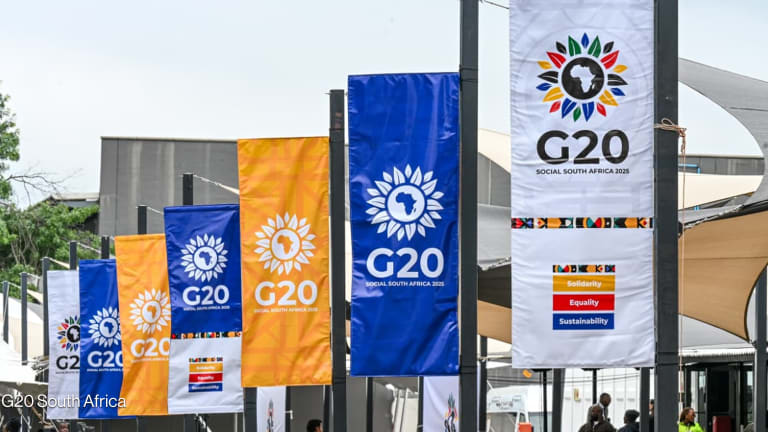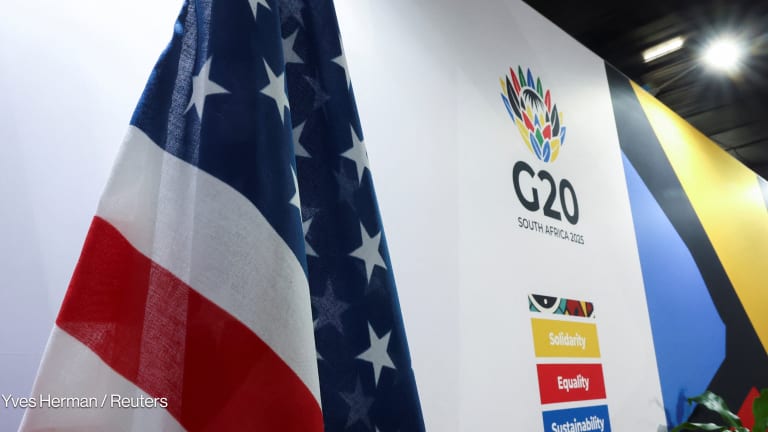What killed the EU-AU meeting?
"You need two to tango," according to one insider — but this week, the EU found itself without a partner.
BRUSSELS/GABORONE — The search is still on to understand why a meeting of African Union and European Union leaders was postponed at the last minute this week, ending what was supposed to be a year of rejuvenated relations on a sour note. In October, European Council President Charles Michel announced the Dec. 9 exchange as “a strategic meeting with African leaders in order to deepen, but also to renew the partnership with Africa.” An agenda, published online by the EU and since taken down, included the fight against COVID-19, long-term recovery efforts, debt relief, and the need to build momentum for the sixth EU-AU summit that had to be pushed to next year due to the pandemic. Initially, the idea was to meet in person in Brussels, but COVID-19 continued to complicate preparations. Health concerns prompted a switch to a videoconference involving Michel, European Commission President Ursula von der Leyen, and German Chancellor Angela Merkel. The trio were to meet virtually with AU Chair and South African President Cyril Ramaphosa, African Union Commission Chairperson Moussa Faki Mahamat, and the leaders of states from the AU’s bureau: the Democratic Republic of the Congo, Kenya, Egypt, and Mali. In Europe, attention was mostly on Brexit negotiations and securing the EU’s next seven-year budget. Nonetheless, when EU leaders met by videoconference Monday to plan the week ahead, the Wednesday meeting with the African leaders was still on, an EU official told Devex. “We didn’t see any obstacle coming our way,” the official added. But by Tuesday afternoon, it was off. The day before the call, Ramaphosa recommended the meeting be postponed “until further notice,” citing the low level of attendance from heads of state. As one European diplomat told Devex, it is “very unusual to pull it that late.” The EU side — whose leaders still had the meeting listed on their public agendas Wednesday morning — was left in face-saving mode, while NGOs and diplomats wondered what went wrong. Officially, the EU cited “agenda issues,” and Ebba Kalondo, spokesperson to the chair of the African Union Commission, also told Devex that the problem was merely one of “scheduling”. The two sides have different understandings of who was available, however. The EU official told Devex that all participants had confirmed their attendance, apart from President Uhuru Kenyatta of Kenya, who was receiving the prime minister of conflict-affected Ethiopia, and Egyptian President Abdel-Fattah el-Sissi, who was on a trip to Paris. The Egyptian prime minister was expected on the call instead, according to the EU official, who added that Congo also took part in a test call Tuesday. But Kalondo said the AU’s understanding was that President Félix Tshisekedi of Congo was also unavailable, due to domestic issues. “It was not a quorum of the bureau of the heads of states of the AU, and therefore we asked that it be postponed,” Kalondo said. “It’s not canceled.” The government of Congo did not respond to repeated requests for comment, while the South African government had a different reason altogether for the postponement. Lunga Ngqengelele, a media liaison at its Department of International Relations and Cooperation, told Devex the meeting was postponed as preparations were not finalized and insisted that both parties supported the postponement. “The plans were not up to the point where they were satisfied that they can continue with the meeting,” he said. When pressed for details on which side was not prepared, he said that “the most important thing is that the meeting was postponed and it was agreed based on some of the work [that] still needed to be done.” Either way, the optics of abandoning a meeting designed to reinvigorate a relationship that the EU has been seeking to improve were not good. “Chancellor Merkel attaches great importance to relations with Africa,” a German government spokesperson told Devex on Wednesday. “The cancellation of today's EU-AU meeting is therefore regrettable, and an early rescheduling is desirable.” Asked when the AU became aware that the scheduling clashes were so severe that the meeting would need to be postponed, Kalondo wrote in a message that “the Chair of AU sent the notice as soon as it was made aware, which was [Tuesday].” “You need two to tango,” the EU official told Devex, adding that Ramaphosa’s request for a postponement was “a signal you can’t neglect.” The EU official said that the meeting had been carefully prepared and that they were not aware of any disagreements over the agenda, which they said was primarily designed to “take stock” of efforts to combat the health and economic effects of COVID-19. Quoted in European media after the postponement, anonymous AU officials questioned the EU’s insistence on holding a curtailed virtual meeting amid the pandemic, rather than waiting for a face-to-face with more participants next year, and argued the postponement reflected the failure to properly consult the African side in the lead-up. Luckystar Miyandazi, policy officer at the European Centre for Development Policy Management think tank, told Devex on Wednesday that the move was a sign of the AU becoming more assertive in its relationship with the EU. “[The AU] recognizes that substantial representation of its member states is key for partnership building going forward with the EU,” she wrote to Devex. “Thus [it] wants more [heads of state] in the room.” Sara Jerving in Nairobi and AC. Lumbu Lailay Bush in Lubumbashi, Congo, contributed reporting.
BRUSSELS/GABORONE — The search is still on to understand why a meeting of African Union and European Union leaders was postponed at the last minute this week, ending what was supposed to be a year of rejuvenated relations on a sour note.
In October, European Council President Charles Michel announced the Dec. 9 exchange as “a strategic meeting with African leaders in order to deepen, but also to renew the partnership with Africa.”
An agenda, published online by the EU and since taken down, included the fight against COVID-19, long-term recovery efforts, debt relief, and the need to build momentum for the sixth EU-AU summit that had to be pushed to next year due to the pandemic.
This story is forDevex Promembers
Unlock this story now with a 15-day free trial of Devex Pro.
With a Devex Pro subscription you'll get access to deeper analysis and exclusive insights from our reporters and analysts.
Start my free trialRequest a group subscription Printing articles to share with others is a breach of our terms and conditions and copyright policy. Please use the sharing options on the left side of the article. Devex Pro members may share up to 10 articles per month using the Pro share tool ( ).
Vince Chadwick is a contributing reporter at Devex. A law graduate from Melbourne, Australia, he was social affairs reporter for The Age newspaper, before covering breaking news, the arts, and public policy across Europe, including as a reporter and editor at POLITICO Europe. He was long-listed for International Journalist of the Year at the 2023 One World Media Awards.
Rumbi Chakamba is a Senior Editor at Devex based in Botswana, who has worked with regional and international publications including News Deeply, The Zambezian, Outriders Network, and Global Sisters Report. She holds a bachelor's degree in international relations from the University of South Africa.









